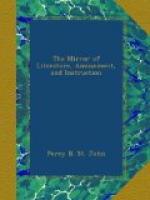THE BIJOU
Is very properly entitled “An Annual of Literature and the Arts,” since considerably more attention seems to have been paid to the Illustrations than to their accompaniments. Few of the prose or verse pieces present much novelty of matter or manner; but the following will, perhaps, be esteemed a curiosity:—
PORTRAIT OF UGO FOSCOLO.
(From the Italian,) by Himself.
A furrow’d brow, intent and deep
sunk eyes,
Fair hair, lean cheeks, are mine,
and aspect bold;
The proud quick lip, where seldom smiles
arise,
Bent head and fine form’d
neck, breast rough and cold,
Limbs well compos’d; simple in dress,
yet choice:
Swift or to move, act, think, or thoughts
unfold;
Temperate, firm, kind, unus’d to
flattering lies,
Adverse to th’ world, adverse
to me of old.
Oftimes alone and mournful. Evermore
Most pensive—all unmov’d
by hope or fear:
By shame made timid, and by anger brave—
My subtle reason speaks; but,
ah! I rave,
’Twixt vice and virtue, hardly know
to steer
Death may for me have FAME and rest
in store.
There is an abundance of Sonnets and short pieces which would dovetail in our columns, were we tempted by their merit to extract them; but, in place of enumerating them, we notice the Engravings, some of which are excellent specimens of art. Among these is a Portrait of THE KING, by Ensom, from a painting by Sir Thomas Lawrence, in the collection of Sir William Knighton, Bart. Next is Ada, a Portrait of a Young Lady, delicately engraved by T.A. Dean, after Sir Thomas Lawrence. The print is about the size of a crown-piece, a perfect gem—a bijou in itself. The African Daughter, by Sangster, from a picture by Bonington, abounds with vigorous and effective touches; some of the lights are extremely brilliant. Next is the Portrait of Mrs. Arbuthnot, by W. Ensom, from the President’s picture, full of grace and life, and richly meriting the term exquisite: nothing can be finer than the dark luxuriant hair contrasted with the alabaster delicacy and elegance of the features; the eyes too beam with benignant expressiveness. Wilkie’s Bag-Piper has been powerfully engraved by Aug. Fox; and a Portrait of Lady Jane Grey, after De Heere, is an interesting variety. Milton composing Paradise Lost, from a drawing by Stothard, is far from our taste; but the Blue Bell, by Fox, from a picture by W.A. Hastings, somewhat atones for the previous failure: its prettiness is of the first class.
Our notice has extended to all the Engravings except one—Rosalind and Celia—about which, the less said the better. There are, perhaps, too many portraits in the collection, but taken apart, they are among the first-rate productions of their class.
* * * * *




